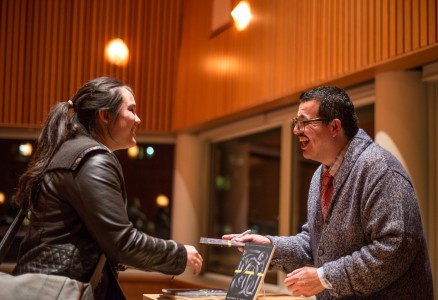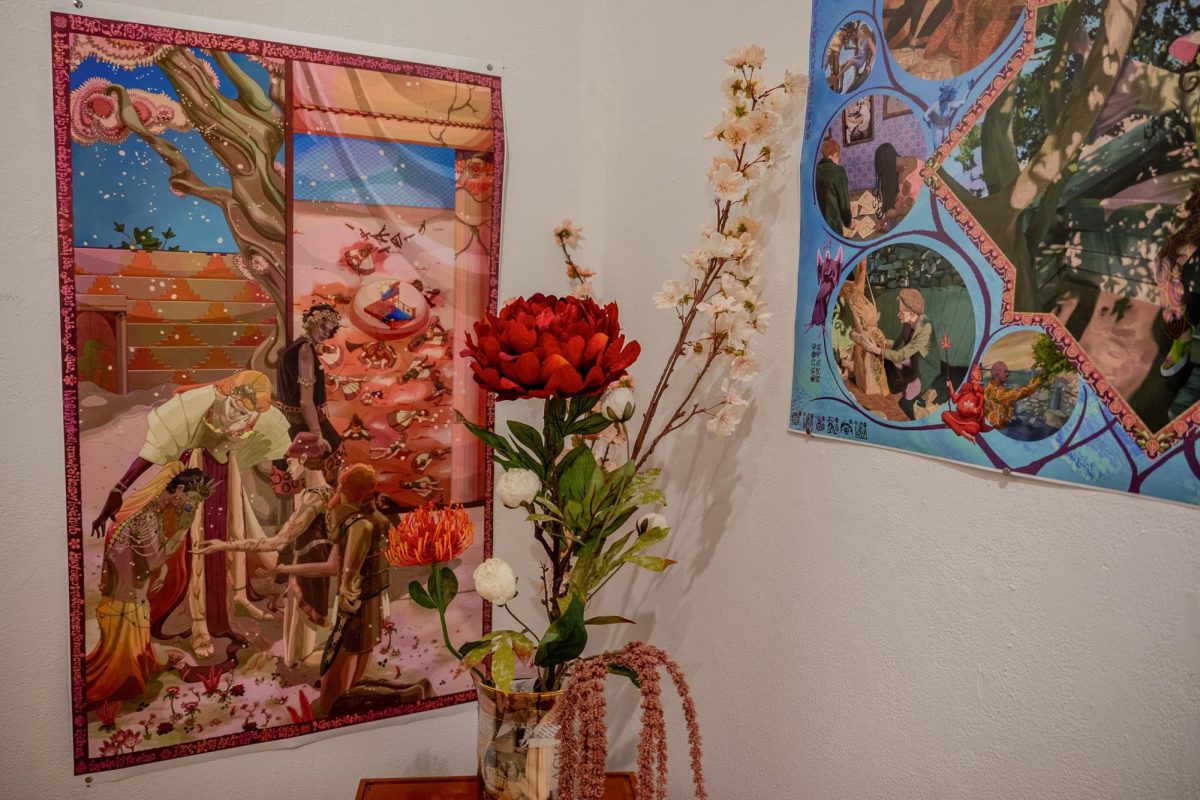Last night, Eduardo C. Corral read poems from his book “Slow Lightning,” as part of the ongoing Writers@Grinnell series. Corral is an award-winning American poet, who won The Yale Series of Younger Poets competition in 2011 for “Slow Lightning.” He has been honored with a Discovery/The Nation Award, the J. Howard and Barbara M.J. Wood Prize for poetry and a Whiting Writers’ Award. The S&B’s Susanne Bushman ’16 sat down with Corral after his reading.
In your introduction, they mentioned that you don’t like to be called a poet. Why is that?
I believe, when you say “poet,” I think of our masters, the greats … Elizabeth Bishop, Walt Whitman, Emily Dickinson, and I am mere mortal. I’m just a young poet and I prefer to be called a writer. Maybe one day I’ll earn the title of poet by writing better poems—because I’m aware of the greats that came before me.
Did you always aspire to be a writer?
No. I never thought of myself as a poet until undergrad at Arizona State University when I took a literature course by mistake. The literature course had a workshop component by mistake and that’s when I first started writing poems. The professor saw something in those first poems and that’s how I started forming, by accidentally signing up for a course that had a workshop component. … My professor … was very encouraging. He said, “If you’re writing now you’ve got to start reading.” So I started reading poetry, too. Then, after a while, he started encouraging me to talk to the poets on the MFA faculty at Arizona State University … and they were very kind and generous to me, too, and that’s what got the ball rolling.
You’ve said that your first book, “Slow Lightning,” is an homage to Robert Hayden. What about his work, specifically, captured you so much?
… All language is a play for Robert Hayden. He could write English as beautiful and clear as English in the King James Bible, or he could write using slang from the streets of Detroit. So, everything was available to his poems and I took that from him.
You speak both Spanish and English, and you do a lot of code-switching, or switching between the two languages. Do you believe that this affects what you choose to write about?
No, because I have trained myself as a poet to listen to language—to follow it. When I find the right language—the right words or phrases—that right language suggests, tells me, what it wants to talk about, the subject matter. So, I find the language first, then the subject matter.
What is the poetry writing process like for you?
My poetry process begins with notebooking. I observe, I listen, every day I notebook. And if something catches my eye or ear, I note it in my notebooks. That’s usually the trigger for the poem. … Most poems begin as an interruption of daily life. Something catches your eye or ear, you remember something, a memory, so you kind of pause your daily life. That’s usually the beginning of a poem. That’s the trigger.
I noticed during your reading that in your poems there are a lot of images of musical instruments, anatomy, animals and sexuality. Do these reflect your other interests outside of poetry?
There are a lot of musical instruments in my poems because I’m a frustrated musician. I wish I had a musical ability, but I cannot play a lick to save my life … and also pianos, string instruments, trumpets, French horns, tubas, they’re beautiful objects. And I just wanted to write about them, imagine them, in my work.
You’ve experienced a lot of success. Has this changed the way that you write or the way that you feel about your writing?
It hasn’t changed the way that I feel about my writing because self-doubt is part of the writing process—something constant to writers who are aware of themselves as writers. If you don’t have any doubt as a writer, you should worry. … Doubt should ride shotgun, doubt should never have its hands on the steering wheel. It should be a companion, now and then.
Your family has a big influence in your work, you mentioned them a lot at the reading, how do they feel about being featured so heavily in your poetry?
It’s something very new in our family, to have a writer or a poet writing about our family history. I don’t think it feels real to them, because it’s something so new, especially for my parents. It hasn’t hit them that they’re in these poems yet. It’s just so different. We don’t imagine our lives worthy of literature, and it’s hard to see it sometimes. So yeah, no complaints so far. Maybe that’s the answer: nobody’s complained yet.
During your reading, you said “Steal, young poets, steal,” referring to borrowing other writers’ words. Do you have any other advice for aspiring poets?
Trust the language in your own backyard. Trust the stories in your own backyard—the stories your mother tells you, your grandmother tells you, the language your papa uses to describe his workday. There’s where your poetry’s going to start. Trust your own backyard.
























































